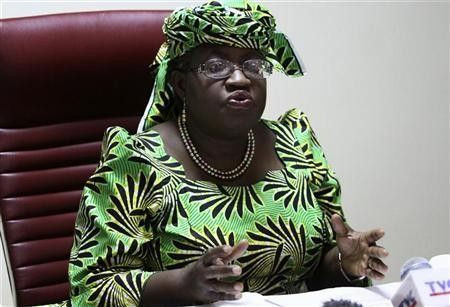Ngozi Okonjo-Iweala, Not US's Kim, Should Lead World Bank: El-Erian

Ngozi Okonjo-Iweala, Nigeria's finance minister, is gaining favor from several quarters for the presidency of the World Bank over two rival contenders.
Mohamed El-Erian, co-chief investment officer of Pimco, the world's largest bond investment firm, wrote in a recent commentary that she should dominate the field. His views echo those of several prominent observers.
Jim Yong Kim, president of Dartmouth College, is the American candidate. Jose Antonio Ocampo, a Colombian economist, is the third candidate for the presidency of the World Bank, whose stated mission is to reduce poverty and support development using tools like loans and grants.
Kim, while an inspired nominee from President Barack Obama, is not the best choice, said El-Erian, who decried the feudalistic practice of permanent American control of the bank presidency.
Former World Bank economist William Easterly, referring to Kim, told the Washington Post the top job requires a mind-set to allocate scarce funds, rather than approaching the problem as if we have unlimited resources for suffering people. Frankly, I see some danger signs in this kind of pick.
The Dartmouth president's closest experience of leading a large international institution was heading the World Health Organization's HIV/AIDS department.
Aside from the lack of operational experience, Kim may lack the global Rolodex vital to doing this job, said columnist Edward Luce of the Financial Times, which also has written that the World Bank president should have a command of macroeconomics.
Okonjo-Iweala, on the other hand, has built a resume that makes her splendidly qualified, many observers say. She has a Ph.D. in regional economics and development from the Massachusetts Institute of Technology and used her own global Rolodex to negotiate a debt reduction of 60 percent on Nigeria's $31 billion debt to the Paris Club in 2005 as the country's finance minister.
Reuters blogger Felix Salmon called her handling of Nigeria's debt reduction an astonishing feat of negotiating prowess, not least because the Paris Club had never before allowed a country to buy back its debt below par, let alone 60 [percent] below par.
Okonjo-Iweala also managed to increase transparency in the famously corrupt Nigerian government during her tenure.
Before becoming Nigeria's finance minister in 2003, she worked as the vice-president and corporate secretary of the World Bank.
From late 2007 to part of 2011, she was also the World Bank's managing director, in effect a deputy to Bob Zoellick, the outgoing president...[knowing] the institution inside out, wrote Luce.
El-Erian speculates that U.S. officials know Kim is not the best candidate. But they seem more attached to America's historic entitlement of having an American as the World Bank president, thereby opting to oppose Okonjo-Iweala, whom he sees as the best choice.
When economists from the World Bank visit poor countries to dispense cash and advice, they routinely tell governments to reject cronyism and fill each important job with the best candidate available. It is good advice. The World Bank should take it, opined the Economist.
© Copyright IBTimes 2024. All rights reserved.





















